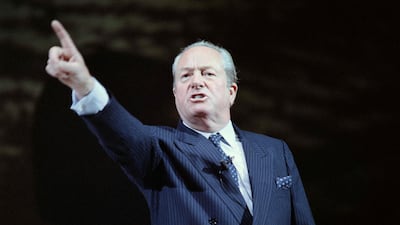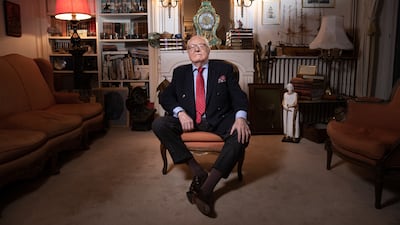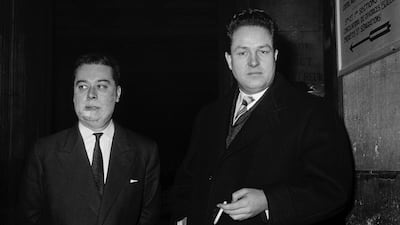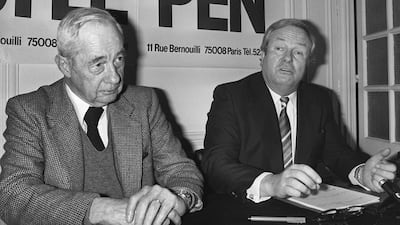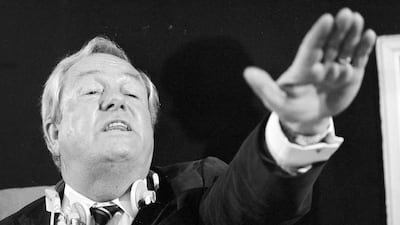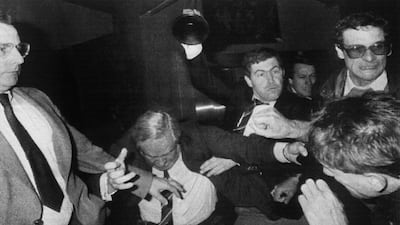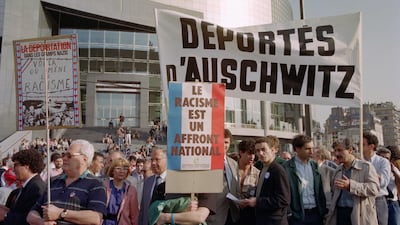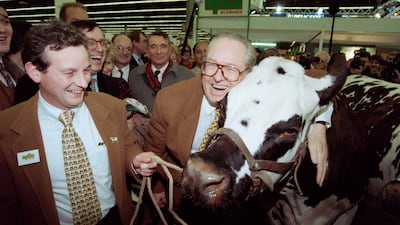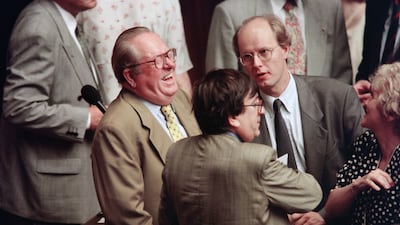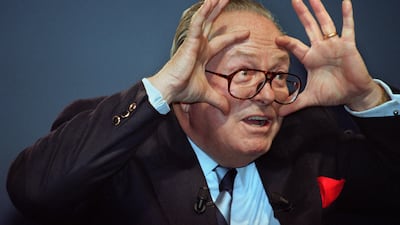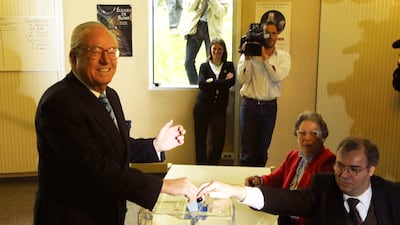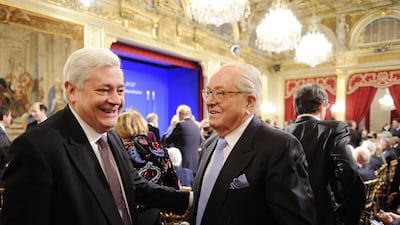Despite his seemingly auspicious origins, Jean-Marie Le Pen, who died this week aged 96, would become one of Europe’s most divisive politicians. He was raised on the picturesque but rugged Brittany coast and attended a Jesuit boarding school in north-western France. He served as a paratrooper for the French Foreign Legion and went on to study law.
Le Pen, the son of a sailor and a seamstress, was better known as a Holocaust denier who was convicted of assault and hate speech, who was once barred from political office, and who espoused xenophobia and anti-Semitism as the co-founder and leader of the far-right National Front party. It is no stretch to suggest Le Pen was the progenitor of the radical populism sweeping Europe.
Le Pen was born in 1928 in La Trinite. He was dismissed from school for insubordination but managed to finish his education, though not without more misdemeanours. At university, where he sold a staunchly monarchist newspaper, he was connected to a group known for brawling with communists on campus in Toulouse. As a paratrooper he served in Algeria and fought in the Second Arab-Israeli War. “I fought alongside Israeli soldiers in 1956,” Le Pen said. “I was among the French paratroopers who parachuted into the Suez Canal.”
Speaking in 2022 of that experience, he said he sympathised with Israel, “the small nation that fought for its survival and existence, and managed to seize its ancestral land. I have always been friendly towards it, than adversarial.” However, as Prof Cecile Alduy, an expert on the National Front party, notes: “Jean-Marie Le Pen also expressed sympathy for the Palestinian people in the '90s, and was against any alignment on the US’s politics in the Middle East.”
Elsewhere in the region, Le Pen backed Bashar Al Assad’s forceful response to the uprising in Syria, claiming it was normal for a state to defend itself. Well in excess of half a million people are known to have been killed in the Assad regime’s struggle for survival, which ended with the former president's flight from the country to exile in December.
With military service under his belt, Le Pen entered the sphere of politics where he would spend more than six decades, having first been elected to parliament in 1956. In the 1960s he set up a publishing group that edited and sold recordings of Nazi speeches and military songs alongside Leon Gaultier, a Frenchman who had fought for the Waffen SS during the Second World War. The pair were among the motley crew who formed the National Front in 1972 to challenge mainstream conservatism, chiefly by asserting a threat represented by immigration to France, from North Africa in particular. Le Pen, who soon took control of the party, essentially wanted his version of French society to be shielded from any influence of non-white, non-Christian cultures.
The banning of building more mosques in France became policy and European integration was opposed. As Jean-Yves Camus, an observer of radical politics, puts it, under Le Pen the National Front was “an extreme-right party which had in its ranks people who were neo-fascists, neo-Nazis, negationists and anti-Semites”. Le Pen’s first conviction as a politician (he had previous for assault and battery) came in the 1960s, a hefty fine and suspended jail term for an "apology of war crimes"; such behaviour, with similar consequences, would become habitual. He was a classic racist, one who frequently made indubitably racist remarks only to deny that they were – “we do not hate the Turks, we love them, but in their country” – and was adept at playing down precisely the brand of anti-Semitism his party championed: “Before the intifada, there were three or four incidents of anti-Semitism a year, and that’s out of 18 million crimes and violations of the law.”
Still, his political views were garnering rising support. Le Pen earned one per cent of the vote in his first foray into France’s presidential elections in 1974; by the mid 1980s and into the 1990s, this was up to 15 per cent. Then, in 2002, he sauntered through the first round of voting, with an 18 per cent proportion, qualifying for a run-off with Jacques Chirac. Such a far-right rise to prominence served as a wake-up call to France. With mass public protests and most political figures rushing to endorse Chirac, Le Pen lost out to his rival, though not without his extreme populism making its mark. Even in 2007’s presidential elections, he landed 10 per cent of the vote.
From 1984, Le Pen was an elected member of the European Parliament, where he vehemently rejected the proposed EU constitution. He wasn’t the most popular MEP in the chamber and was barred from presiding over its opening session in 2009. Perhaps his most abhorrent public comment came in 1987, when he dismissed the Holocaust as a mere “detail of history”. Rather than repent, he reaffirmed this view in any number of ways thereafter, for example: “I'm not saying that the gas chambers didn't exist. I couldn't see them myself.” In 1998, he was barred from political office for two years for assaulting a political rival during an election campaign. A decade on, he told Le Monde newspaper that “you can’t dispute the inequality of races”.
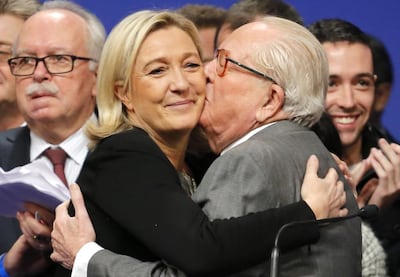
His daughter Marine Le Pen supplanted him as National Front president – she was to rename it National Rally – in 2011, with her father becoming honorary president. In 2015, after reiterating his diluted version of the persecution of Jews in the Second World War, his daughter suspended him from the party. A brouhaha followed, culminating in his expulsion. His public popularity also faded, with contentions such as the need for a French-Russian alliance to save “the world of the whites” increasing the criticism against him. In 2021, aged 93, he was again in court charged with inciting anti-Semitic hatred. Le Pen even publicly supported far-right winger Eric Zemmour over his daughter in the 2022 electoral process.
Le Pen was orphaned in 1942 when his father’s boat was blown up by a mine. The veteran politician claimed he lost his left eye due to a savage beating – “political rivals attacked me. I was kicked in the face and I lost my eye as a result” – but this account is disputed, with an alternative version that the injury happened while setting up a tent at a campaign event widely believed. For years, an eye patch formed part of his look. He was married to Pierrette Lalanne for 27 years and in addition to Marine, they had two other daughters, Marie-Caroline and Yann. Le Pen married Jeanne-Marie Paschos in 1991. All survive him.
The world may be quieter without Le Pen’s firebrand rhetoric, yet in 2024 the party he once led won, with allies, 142 of the 577 seats in the French national assembly. The spread of right-wing radicalism in Europe indicates an enduring influence. As columnist Colin Randall previously noted for The National, Le Pen would regard this “continent-wide far-right advance as a part of a more meaningful legacy”, above all else.
